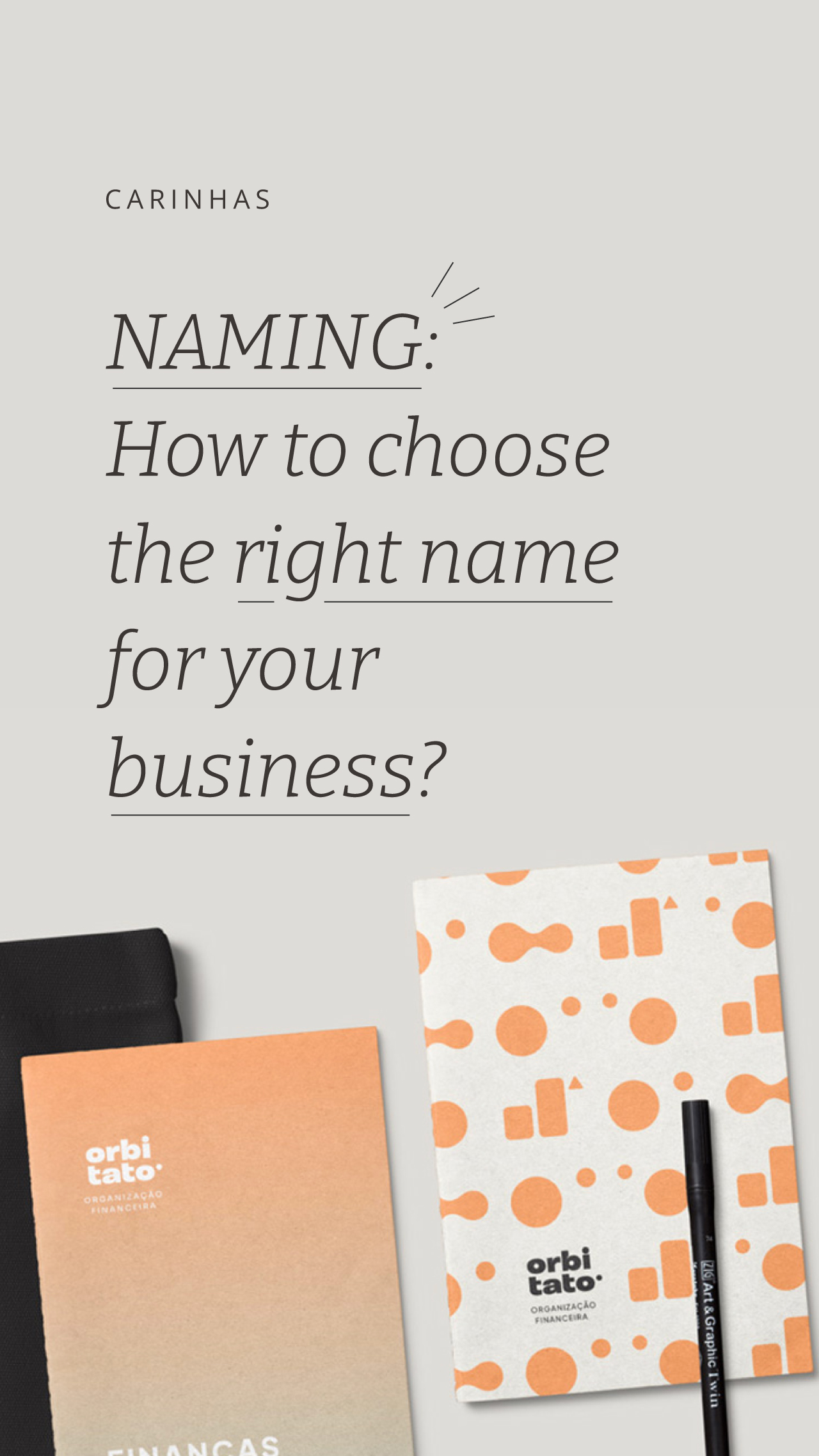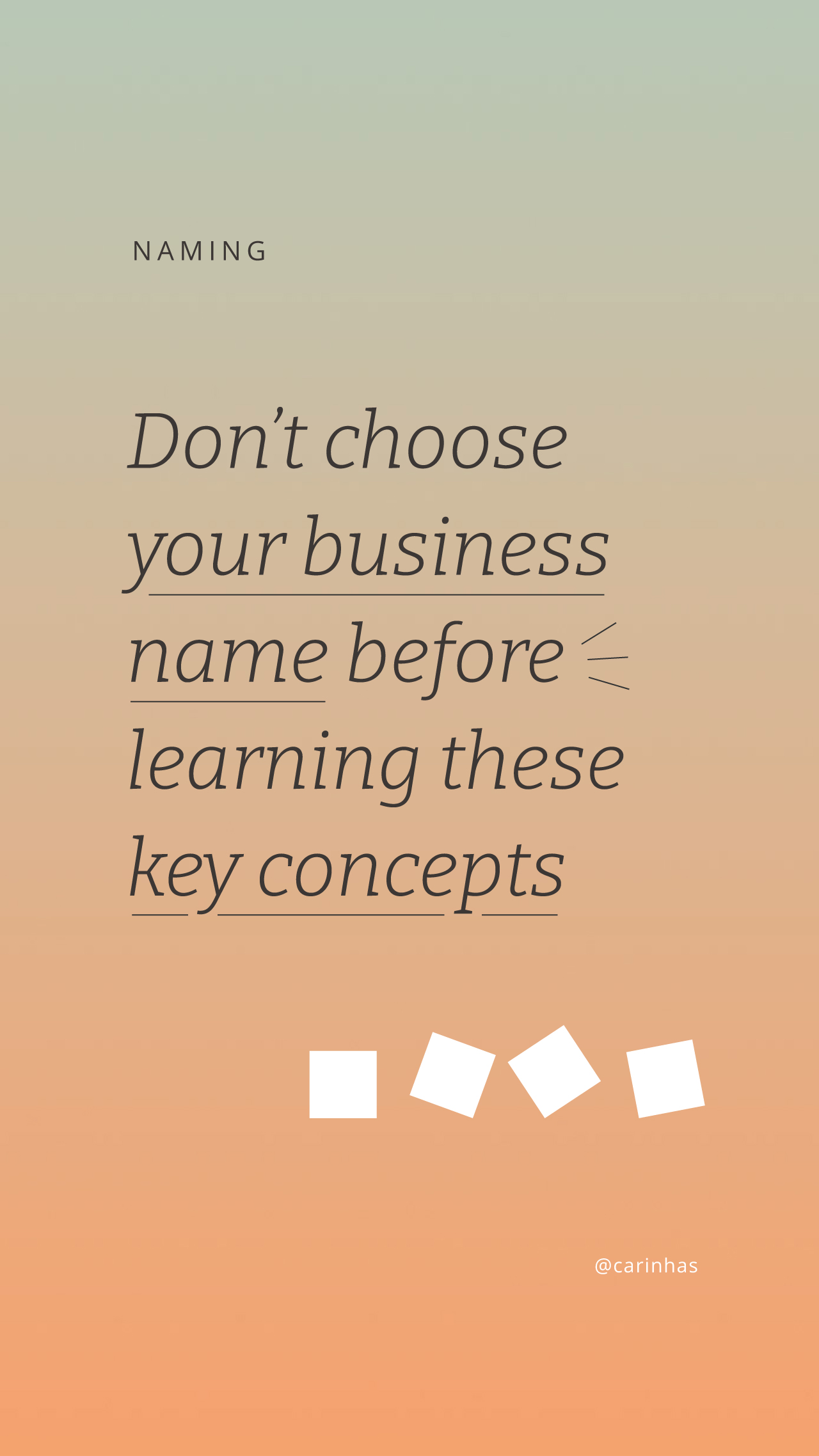“I’ve had a thousand ideas, I’ve racked my brain, and I still haven’t found the perfect name for my business”. If you’ve ever felt this way, take a deep breath. Choosing a business name often turns out to be harder than it looks and it’s completely normal to feel uncertain during this stage. That’s exactly why there’s a whole multidisciplinary field dedicated to this process: Naming. We create names professionally, but we understand that many people try to tackle this step on their own or with the help of someone close. After all, naming a dream feels deeply personal.
“We believe that names need to be provocative. Even the most complicated messages can be distilled into a form that grabs people’s attention and holds it.”
Danny Altman
But your business name doesn’t just need to sound beautiful or creative. It also needs to be registrable, in other words, it has to offer exclusive rights to use it. And here come the questions you might be asking yourself right now: How can I choose a name that truly makes my business stand out? How do I know if I can officially use the name I’m thinking of? To answer these questions with more confidence, there are a few key concepts that can help and that’s exactly what we’re going to explore in this article.
1 – Watch out for what’s called a “weak trademark”
If we had to choose just one word to explain what makes a name legally protectable, it would be this: differentiation. Having a unique name helps your business stand out in the market and it also increases your chances of securing legal protection. But not every name can do that. If the name is too generic, purely descriptive, or just something people hear all the time, it might work for communication, but it usually won’t pass the trademark registration process. That’s what’s known as a weak trademark names that simply aren’t distinctive enough to be protected by the INPI (Brazil’s National Institute of Industrial Property).
But how can you tell if the name you’re considering has this issue? “A weak trademark” is one that directly describes what your business does, without any uniqueness. For example, “Good Tire” for a tire shop, “Projects” for an architecture firm, “Japan House” for a Japanese restaurant, or “Dry” for a diaper brand. These examples were shared by trademark attorney Moysés Remma, and they clearly illustrate what we should avoid. So here’s our gentle advice: try to avoid names that describe exactly what your business does, in the same way everyone else already does. It might seem simple and straightforward, but this path almost always closes the door to trademark registration.
+ Also Read – Naming Your Brand Is Like Naming a Baby (or a Pet)?
2 – Naming: the power of the “magic word”
Now that you understand what a weak trademark is, the next question naturally follows: So how do I come up with a strong name that actually has a chance of being registered? One possible answer lies in what we affectionately call magic words. These are names made from words that don’t really exist as we know them, they’re often born from a fusion of other words, a new expression, or even a completely invented term. The magic happens when this new word becomes something that represents only your business, full of personality and originality. This kind of choice brings two big advantages. First, your business name gets a unique identity, which makes it stand out much more in the market. And second, the chances of successfully registering the name with the INPI increase significantly, because exclusivity is already built into its essence.
When we created the name Orbitato, the goal was to bring a sense of lightness to a topic that usually feels quite heavy: financial management. The name is a fusion of “órbita” (orbit) and “tato” (touch), suggesting a gentle kind of guidance, someone who helps place a business on the right path with sensitivity. This name didn’t exist before, but it was born to belong to this company alone. And from the very beginning, it already carried a piece of the brand’s purpose: to turn financial chaos into something smooth and natural, like a planet in motion. Orbitato is a magic word because it’s unique, memorable, fits the service perfectly and was successfully registered with the INPI.
+ Also read – Naming: How to Pick the Ideal Name for Your Company
Orbitato is the kind of name that starts with purpose, takes shape, and goes far, just like a good orbit should. See the full project.
3 – What is a tagline and why does it make a difference?
Some names are beautiful, catchy, and unique, but they don’t really say much about what the company does. And that’s totally okay. What helps in these cases is having a tagline, a short word or phrase that accompanies the name and makes the proposition clearer from the very start. A tagline works as a strategic complement. It can help your business position itself better, explain what it does, and connect more quickly with people who are encountering your brand for the first time. In many cases, it pairs with the name and the visual identity to form a strong communication trio, transmitting the essence of your brand more clearly. A tagline is different from a slogan, which is typically used in specific campaigns and can change over time. A tagline, on the other hand, tends to stay the same and accompanies the name across various brand materials. It becomes part of the identity. But there are also cases where a slogan becomes so successful that it turns into the official tagline, like Nike’s famous “Just do it”.
A good example of this is the Fatéri project. The name comes from Latin and means “admitem” (to admit). It sounds beautiful, is unique, and strong, but on its own, it doesn’t reveal what the company does. That’s where the tagline comes in: “gluten-free life”. With this short phrase, the brand’s proposition becomes clear: Fatéri is a bakery and snack bar that is entirely gluten-free and free from cross-contamination. The tagline captures the brand’s mission in a few words, creating a bridge between the name and the company’s value proposition.
Fatéri is a Latin word that means “admits”. A name that embraces, acknowledges, and invites people to live a gluten-free life. See the full project.
4 – What are the Nice Classifications?
When you think about protecting your company’s name, it’s important to know that the registration depends not only on the name itself but also on the area where your business operates. This is because the INPI (National Institute of Industrial Property) organizes registrations into classes, representing different market sectors. These are the Nice Classifications. It’s worth mentioning that the Nice Classifications are not unique to Brazil. Many countries around the world, including the United States, the European Union, and others, also adopt this classification system when needed. This makes international brand protection much more organized and consistent across different markets. The good news is that, thanks to this system, two businesses can have the same name as long as they operate in different segments and there is no confusion for consumers. This may seem like a technical detail, but it makes all the difference to ensure the safe and exclusive use of your brand where it really matters: in your field of operation.
It’s the same principle we applied when creating the name Plumita, a psychology clinic for children and adolescents. Since the service is related to healthcare, the registrability search considered Class 44, which includes medical and psychological services. After registration, the business was protected and secure to keep growing, just the way it believes and desires. Now, if another company wanted to use the name Plumita to sell clothes, for example, it could register under Class 25, which is for the apparel industry. Since these are very different fields, it’s unlikely that someone would confuse a psychology clinic with a fashion brand. In this case, both could coexist in the register, each with its own purpose, without interfering with each other.
+ Also Read – Is It the right Time to Invest in My Brand Design?
Light as a feather, strong as a well-registered name. Plumita is a child psychology clinic protected under Class 44. See the full project.
5 – Specialized help in naming makes a difference
Choosing your company’s name involves both sensitivity and attention to technical details. And it’s perfectly fine if this feels like a whole new world, this is why there are professionals prepared to walk alongside you. On the creative side, working with a team specialized in Naming (like ours) ensures the name has soul, coherence with your brand, and real potential for enchantment. On the legal side, a specialized lawyer can analyze whether the name is strong enough to be registered, advise on the Nice Classifications, and guide the entire process with more confidence.
But take a deep breath: when you choose to do Naming with us, the technical side is already taken care of. We work with consulting lawyers throughout the process, so you don’t need to worry about any of that. Once the name is chosen, we provide everything ready for registration, and if you wish, we can even recommend trusted professionals to guide you through this final step. Your role in this process is to choose with your heart. Ours is to take care of everything with the same care you put into your dream.
+ Also Read – Use Your Own Name for Your Business or Create a New One?
Conclusion
Choosing your company’s name is much more than just a creative decision. It’s an important step to ensure your brand has identity, authenticity, and the security it needs to grow. As we’ve seen throughout this article, there are several details that deserve attention before making the final choice, from avoiding a weak name to understanding which Nice Classification classes your business will operate in. And yes, all of this might seem a bit complex at first. But you don’t have to go through it alone. We’re here to support you, with listening, care, and plenty of experience. We create names that connect, that inspire, and that have the technical attention necessary to go far. We’ve created award-winning projects that have won the hearts of many, and we take pride in seeing each of them flourishing out there.
And you, how has this process been for you? Do you already have a name or are you looking for a creative, unique, and registrable name? If you’d like, we can create that together. Request a proposal!









